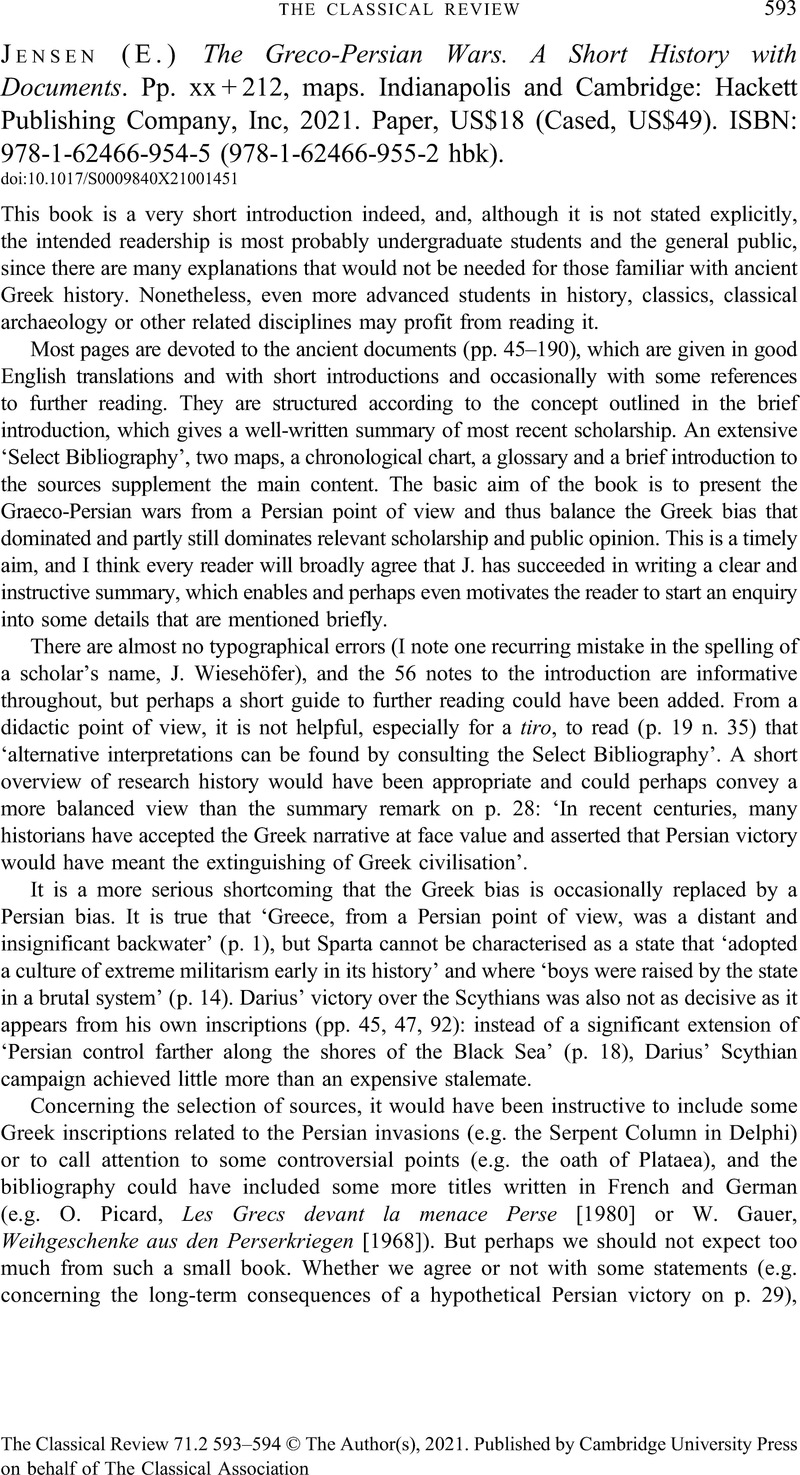This book is a very short introduction indeed, and, although it is not stated explicitly, the intended readership is most probably undergraduate students and the general public, since there are many explanations that would not be needed for those familiar with ancient Greek history. Nonetheless, even more advanced students in history, classics, classical archaeology or other related disciplines may profit from reading it.
Most pages are devoted to the ancient documents (pp. 45–190), which are given in good English translations and with short introductions and occasionally with some references to further reading. They are structured according to the concept outlined in the brief introduction, which gives a well-written summary of most recent scholarship. An extensive ‘Select Bibliography’, two maps, a chronological chart, a glossary and a brief introduction to the sources supplement the main content. The basic aim of the book is to present the Graeco-Persian wars from a Persian point of view and thus balance the Greek bias that dominated and partly still dominates relevant scholarship and public opinion. This is a timely aim, and I think every reader will broadly agree that J. has succeeded in writing a clear and instructive summary, which enables and perhaps even motivates the reader to start an enquiry into some details that are mentioned briefly.
There are almost no typographical errors (I note one recurring mistake in the spelling of a scholar's name, J. Wiesehöfer), and the 56 notes to the introduction are informative throughout, but perhaps a short guide to further reading could have been added. From a didactic point of view, it is not helpful, especially for a tiro, to read (p. 19 n. 35) that ‘alternative interpretations can be found by consulting the Select Bibliography’. A short overview of research history would have been appropriate and could perhaps convey a more balanced view than the summary remark on p. 28: ‘In recent centuries, many historians have accepted the Greek narrative at face value and asserted that Persian victory would have meant the extinguishing of Greek civilisation’.
It is a more serious shortcoming that the Greek bias is occasionally replaced by a Persian bias. It is true that ‘Greece, from a Persian point of view, was a distant and insignificant backwater’ (p. 1), but Sparta cannot be characterised as a state that ‘adopted a culture of extreme militarism early in its history’ and where ‘boys were raised by the state in a brutal system’ (p. 14). Darius’ victory over the Scythians was also not as decisive as it appears from his own inscriptions (pp. 45, 47, 92): instead of a significant extension of ‘Persian control farther along the shores of the Black Sea’ (p. 18), Darius’ Scythian campaign achieved little more than an expensive stalemate.
Concerning the selection of sources, it would have been instructive to include some Greek inscriptions related to the Persian invasions (e.g. the Serpent Column in Delphi) or to call attention to some controversial points (e.g. the oath of Plataea), and the bibliography could have included some more titles written in French and German (e.g. O. Picard, Les Grecs devant la menace Perse [1980] or W. Gauer, Weihgeschenke aus den Perserkriegen [1968]). But perhaps we should not expect too much from such a small book. Whether we agree or not with some statements (e.g. concerning the long-term consequences of a hypothetical Persian victory on p. 29), this book should be included in every college library and also in the reading lists of all courses on classical Greek history.






